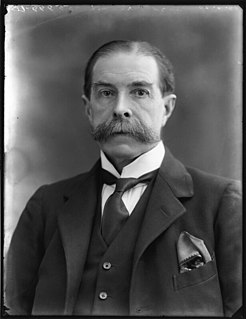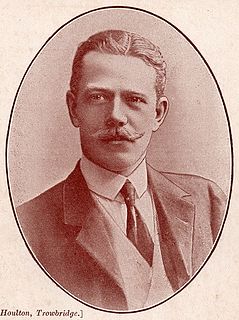
Sir Henry Campbell-Bannerman was a British statesman and Liberal politician who served as Prime Minister of the United Kingdom from 1905 to 1908 and Leader of the Liberal Party from 1899 to 1908. He also served as Secretary of State for War twice, in the Cabinets of Gladstone and Rosebery. He was the first First Lord of the Treasury to be officially called "Prime Minister", the term only coming into official usage five days after he took office. He also remains the only person to date to hold the positions of Prime Minister and Father of the House at the same time.

Robert Threshie Reid, 1st Earl Loreburn, was a British lawyer, judge and radical Liberal politician. He served as Lord High Chancellor of Great Britain between 1905 and 1912.

Osbert Cecil Molyneux, 6th Earl of Sefton,, styled The Honourable Osbert Molyneux until 1901, was a British courtier and Liberal politician. He served as Master of the Horse under Sir Henry Campbell-Bannerman from 1905 to 1907.

David Campbell Bannerman is a British Conservative Party politician who served as Member of the European Parliament (MEP) for the East of England from 2009 to 2019. He served as Deputy Leader of UK Independence Party (UKIP) from 2006 until 2010, when he was replaced by Paul Nuttall.
The High School of Glasgow is an independent, co-educational day school in Glasgow, Scotland. The original High School of Glasgow was founded as the choir school of Glasgow Cathedral in around 1124, and is the oldest school in Scotland, and the twelfth oldest in the United Kingdom. On its closure as a selective grammar school by Glasgow City Corporation in 1976, it immediately continued as a co-educational independent school as a result of fundraising activity by its Former Pupil Club and via a merge by the Club with Drewsteignton School. The school maintains a relationship with the Cathedral, where it holds an annual service of commemoration and thanksgiving in September. It counts two British Prime Ministers, two Lords President and the founder of the University of Aberdeen among its alumni.
Events from the year 1908 in the United Kingdom.

Richard John McMoran Wilson, 2nd Baron Moran, , known as John Wilson, was a British diplomat. He was one of the ninety hereditary peers elected to remain in the House of Lords after the passing of the House of Lords Act 1999.
David Bannerman may refer to:

Sarah Charlotte, Lady Campbell-Bannerman was the wife of British Prime Minister Henry Campbell-Bannerman.

Hunton is a civil parish and village near the town of Maidstone in Kent, England.

Edward Strachey, 1st Baron Strachie PC, known as Sir Edward Strachey, Bt, between 1901 and 1911, was a British Liberal politician. He was a member of the Liberal administrations of Sir Henry Campbell-Bannerman and H. H. Asquith between 1905 and 1915.

Sir John Michael Fleetwood Fuller, 1st Baronet, was a British Liberal Party politician and colonial administrator.

Newton Wallop, 6th Earl of Portsmouth JP, DL, styled Viscount Lymington until 1891, was a British Liberal politician but then joined the Liberal Unionist Party in 1886. He later switched back to the Liberal Party to serve as Under-Secretary of State for War under Sir Henry Campbell-Bannerman from 1905 to 1908.
The Relugas Compact was the plot hatched in 1905 by British Liberal Party politicians H. H. Asquith, Sir Edward Grey, and R. B. Haldane to force the prospective Prime Minister, Sir Henry Campbell-Bannerman, to give up the leadership of the party in the House of Commons. The Compact is significant because it represents a new way of doing party political business at the highest level. In an era when aristocratic power was still taken for granted, the manoeuvring for the highest office in the land represented for the first time distinct political philosophies vying for control of one of the major parties. Learning from an association with Tories Salisbury and Balfour at Hatfield, the Liberal Imperialists stole a march on their rivals to take a step nearer modernisation. Moreover, they brought with them junior ministers such as Sidney Buxton and Henry Fowler making it look like a take over from the Gladstonian Radicals, of which the ageing Prime Minister was the last.

Clara in Blunderland is a novel by Caroline Lewis, written in 1902 and published by William Heinemann of London. It is a political parody of Lewis Carroll's two books, Alice's Adventures in Wonderland and Through the Looking-Glass. The book was followed a year later by a sequel, Lost in Blunderland.

Lost in Blunderland: The further adventures of Clara is a novel by Caroline Lewis, written in 1903 and published by William Heinemann of London. It is a political parody of Lewis Carroll's two books, Alice's Adventures in Wonderland and Through the Looking-Glass. It is the second of Lewis' parodies, the first being Clara in Blunderland.

John Bull's Adventures in the Fiscal Wonderland is a novel by Charles Geake and Francis Carruthers Gould, written in 1904 and published by Methuen & Co. of London. It is a political parody of Lewis Carroll's two books, Alice's Adventures in Wonderland and Through the Looking-Glass.
The Liberal Imperialists were a faction within the British Liberal Party around 1900 regarding the policy toward the British Empire. They supported the Boer War which most Liberals opposed, and wanted the Empire ruled on a more benevolent basis. The most prominent members were R. B. Haldane, H. H. Asquith, Sir Edward Grey and Lord Rosebery.
Henry Campbell may refer to:
Events from the year 1836 in Scotland.












